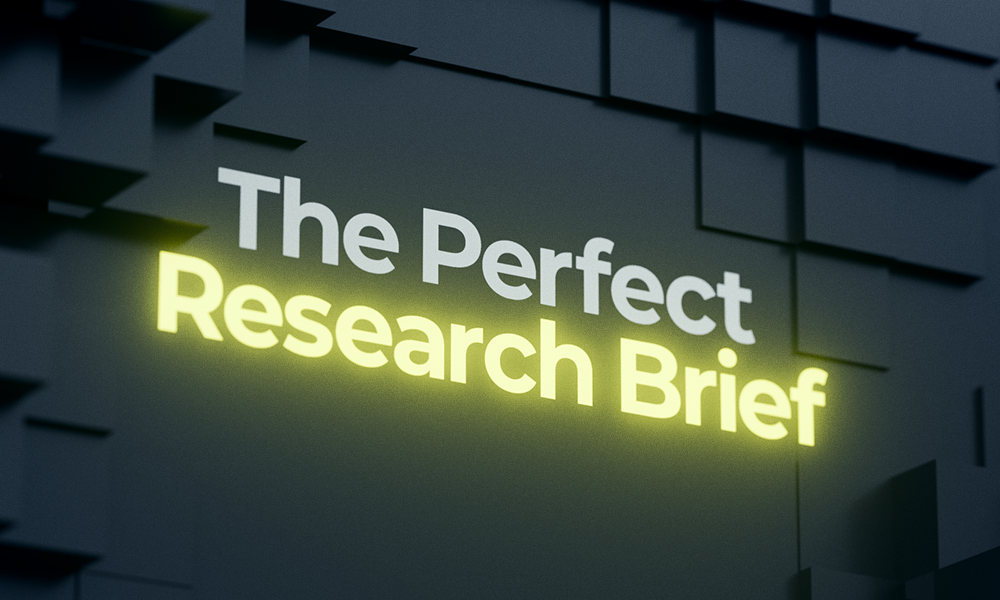Briefing research agencies
In the last Effectiveness Insider, we discussed the advantages and disadvantages of creative testing. Today, we’ll look at how to get the best results from creative testing by focusing on the research brief.
What is the research brief?
A written research brief is an important starting point for any researcher or research agency. It’s a written document that provides a clear understanding of what is required from research and what you hope to achieve from it.
How should a research brief be structured?
Together with some of our most trusted researcher friends, we’ve pulled together six tips on how to structure the best research brief.
Start with the context
Agencies and clients often spend months thinking about the brief. Researchers are then unfairly expected to become experts in a matter of days. Any background to the brief will therefore be incredibly helpful – why the brief exists, what the wider objectives are, who the key stakeholders are, and what discussions have happened between the client and agency so far. Include an understanding of ‘why’ the research is needed and for what end result. This is vital; researchers will match ‘how’ research is conducted once they understand ‘why’ it is happening.
Be clear on the research objectives
Research objectives are different from marketing objectives. A research agency must have a clear sense of what they need to achieve. For example, are they being asked to pick a winning creative, are they being asked to advise on message effectiveness, or are they there to highlight any traps or pitfalls in the creative work? Being clear on the ‘what’ is key to getting the best out of research and the most effective research debrief.
Get detailed when it comes to the audiences
Give as much information as possible on who you want to include (and screen out) within the research. Information such as the definition of your audiences, geographical spread, gender, age, socioeconomics etc. are all vital for recruiting the right people and allowing sufficient time for recruitment if dealing with niche audiences. Any supporting information you have on your audiences will only be useful to a research agency as they start planning recruitment.
Budget, outputs and timings
Though the conversations might be a little tricky early in the process, it’s incredibly helpful for a researcher to know the project parameters early on. It’s counterproductive to give a completely open brief which suggests a comprehensive research solution is needed, when in reality there are tight constraints on budget. Understanding the budget, timings and what outputs will be required will help researchers shape the right (and most realistic) response.
Be upfront about opportunities and limitations
Often the best outcomes are the result of a collaborative relationship between creative agency and researchers; when there is trust, open communication and a shared desire to get the best out of the project. It’s useful to tell researchers what your expectations are in terms of research methodology – is this a chance for them to get innovative or does the approach need to be prescriptive? Also, assess how comfortable the researchers are with your involvement as an agency; knowing this ensures clarity on roles, responsibilities and expectations.
Present creative
In addition to the written brief, a verbal brief of the creative ideas is incredibly useful. Presenting the ideas directly will help researchers understand your thinking and your passion. The more open conversations had about the creative, and the potential stimulus involved, the better they will be at researching the ideas.
Though it may sound implausible, it is astounding how often the research brief is forgotten – leaving researchers scrambling to join the dots of a creative strategy that an agency has spent months developing. At Golley Slater, we’re lucky to work with some fantastic researchers. We believe the effort put in at the beginning of a research project is time well spent – the more you put in at the start, the more rewards you’ll reap at the end.
So, to summarise our top tips for briefing research agencies:
- Provide context and set precise research objectives
- Include detailed audience information
- Be transparent on budget and timings
- Be upfront about what outputs will be needed
- Be clear on practicalities and limitations
- Support with a thorough creative presentation
While brief writing is top of mind, our next Effectiveness Insider article will explore another kind of brief – the client’s marketing brief to the agency. Keep your eyes peeled for our upcoming insider thoughts on what constitutes the most effective agency briefing.

